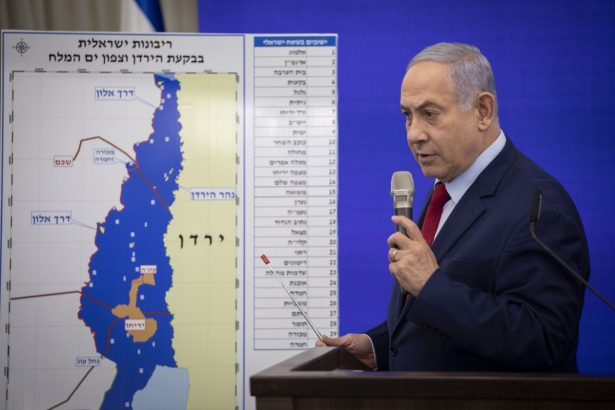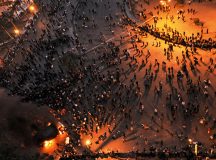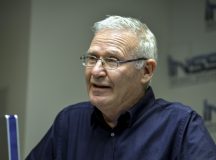Joshua Krasna is a Senior Fellow in the Foreign Policy Research Institute’s Programme on the Middle East and a former Israeli diplomat in Jordan and Canada. He argues that Israel’s year of elections has seen a blurring of the strategic and the political in security and foreign policymaking, resulting in adverse consequences: the loss of ambiguity, the over-exposure of cooperation with Arab states, the conduct of foreign policy by ‘red meat’ announcements and spectacle, a perception of Israel as an enabler of ‘the authoritarian internationale’ and the further erosion of bipartisanship as the foundation of the Israel-US relationship. It will take time, and no little effort, to regain an even keel, he laments.
Introduction
Israel has seen two elections in the past five months, on 4 April and 17 September. The official decision to hold early elections in April came on 26 December 2018, but early elections were in the air and being bruited openly as early as August 2018. This means that Israel has actually been in ‘election mode’ – pre-election positioning, followed by two full-scale election campaigns and subsequent coalition-building – for over a year. Dramatic foreign policy developments have coincided with an election cycle widely thought to be do-or-die for Prime Minister Benjamin Netanyahu, its outcome determining whether and when he goes to trial for bribery, breach of trust and fraud.
The prime minister has been exploiting the ‘bully pulpit’ of incumbency to the maximum. The key message of his intense year-long election campaign, as Likud advertising has emphasised, has been that he is ‘in a different league’ from his opponents: a foreign policy colossus and savant, able to match world leaders and win unprecedented achievements for Israel. Only with Netanyahu’s hand at the tiller, it is claimed, can the Israeli ship of state be navigated through perilous international waters. And the claim has some traction: Israel’s international position has improved markedly over the past decade, with expanded relations with Russia, China and India, as well as with African and, discreetly, some Arab states. There is, however, a contradiction in the Likud message: it says simultaneously that Israel’s international position has never been better but also that it has never been more threatened, not least by Iran and the BDS movement.
Little surprise then that it has been difficult over the past year to separate the strategic, the political and the personal motivations in Israeli foreign policy. The promiscuous admixture of genuine national security considerations and spurious political agendas – and the harnessing of the former by the incumbent – has been the source of much eye-rolling in Israel. It has left us with this question: in the aftermath of the long election season, and no matter who forms Israel’s next government, where will this sometimes chaotic blend of foreign policy developments and initiatives – some real and important, some poorly-timed, overexposed, and even just plain fake – leave Israel in the real world beyond the seemingly never-ending election?
The Foreign Policy Year
The following is a curated, but fairly comprehensive, list of developments directly impacting Israeli foreign and national security policy in the past twelve months. For ease, key political signposts have also been included:
2018
- August 29-September. Discussions regarding the possibility of early elections, due to both an anticipated coalition crisis over Yeshiva students’ enlistment law and a strong showing by Likud in polls.
- October 26. Prime Minister Benjamin Netanyahu (henceforth PM) visits Oman. Says that ‘this visit comes against the background of diplomatic efforts that I have been promoting in recent years vis-à-vis the Arab countries. There will be more.’
- October-November. Series of high-profile visits by Israeli ministers to UAE and Bahrain.
- November 14. Defense Minister Avigdor Lieberman’s Yisrael Beitenu party leaves coalition.
- November 25. President Deby of Chad visits Israel.
- December 4-January 13. Operation ‘Northern Shield’ to locate and destroy Hezbollah tunnels that cross underneath the international border from Lebanon into Israel.
- December 12. Visit to Israel of Italian Interior Minister and head of right-wing Northern League party Matteo Salvini.
- December 26. Elections announced for April 9.
2019
- Reports that PM and his staff are trying to arrange a visit by the PM to Morocco, on March 30 (ten days before the election).
- February 13-14. Warsaw Summit on Middle East, focused on Iran’s influence and terror in the region. PM calls it ‘a historic turning point.’
- 27 February. PM visit to Moscow, meeting with Putin.
- March 25. President Trump signs US proclamation on recognising the Golan Heights as part of the State of Israel during PM visit to Washington.
- March 31. Visit of Brazilian president Jair Bolsonaro to Israel.
- April 3. Russia turns over receives remains of IDF soldier Zecharia Baumel (missing since June 1982) recovered by Russian special forces in Syria.
- April 4. PM visits Moscow, thanks Putin for assistance, receives some of Baumel’s effects.
- April 9. First election – PM unable to build new coalition, Knesset votes to disband itself and new elections are set.
- May 3-6. Escalation with Hamas, hundreds of rockets fired from Gaza into Southern Israel.
- Economic Summit in Bahrain, in context of Trump Peace Plan. Israel not invited to attend, due to Arab sensitivities.
- June 24. Trilateral meeting of US, Russian and Israeli national security advisors in Jerusalem.
- July 1. Foreign Minister Yisrael Katz publicises visit to Abu Dhabi.
- July 2. Mossad chief Yossi Cohen announces renewal of formal relations with Oman and establishment of office of Israel’s Foreign Ministry there, saying ‘that is only the visible tip of a much broader secret effort.’ Report denied by Oman; Israeli MFA declines comment.
- July 19. Israeli and Bahraini Foreign Ministers hold first public meeting on the sidelines of the Advance Religious Freedom conference at the US State Department.
- July 24-25. Second ministerial meeting of Eastern Mediterranean Gas Forum (EMGF) in Cairo, with US participation.
- July-August. Reported Israeli air strikes against targets in Iraq.
- Planned PM trip to Japan and South Korea postponed.
- August 7. Katz, according to a leak from a closed session of the Knesset’s Foreign Affairs and Defense Committee, claims Israel taking part in a US-led coalition to protect shipping through the Strait of Hormuz.
- August 15. Israel bars two Members of US Congress from visiting Israel and the West Bank, after tweets by President Trump.
- August 15. US officials leak that Israel and the UAE have been holding secret meetings, under US auspices, to share information and coordinate efforts regarding Iran.
- August 18-19. PM visits Ukraine.
- August 21. Israel and South Korea conclude a Free Trade Agreement, Israel’s first in East Asia.
- August 24. Israel attacks Damascus airfield to disrupt planned Iranian strike involving weaponised drones. Israeli operation is announced on television by BN while in the Golan Heights with the Chief of the IDF General Staff at his side.
- August 24. Israeli attack on Hezbollah missile upgrade project in Beirut. Rise in tension on the Lebanese border, due to first attack in Beirut since 2006.
- August 25. Appearance of Iranian foreign minister during G7 meeting in Biarritz advances discussion of possible US-Iran talks.
- September 3. PM cancels trip to India planned for week before elections.
- September 8. PM makes sudden visit to London to meet US Defense Secretary Esper and discuss Iran (and possibility of US-Iran talks).
- September 9. PM calls press conference to reveal ‘new’ intelligence on Iranian nuclear program (experts underwhelmed).
- September 10. PM announces plan to extend Israeli sovereignty to Jordan Valley and Northern Dead Sea areas if re-elected.
- September 10. Israeli media report PM’s national security advisor consulted with head of the Central Elections Committee about postponing elections due to a planned offensive in Gaza. According to report, operation – opposed by defense chiefs – aborted ‘at the last moment’ by the Attorney General, who said that the plan required approval of the security cabinet.
- September 10. Trump fires national security advisor John Bolton.
- September 12. PM travels to Sochi to meet Russian President Putin.
- September 14. Trump tweets support for discussions on a formal US-Israel mutual defense treaty.
- September 17. Second Election
Politics and the loss of ambiguity
The list contains authentic national security issues which require management, such as periodic rounds of escalation with Hamas, attack preparations by Hezbollah, Iran and its Shia militia satellites, as well as the emergence of new capabilities and deployments, which require Israel to act in the context of the ‘Campaign Between Wars’ – ongoing in Syria and Lebanon since 2011 and more recently, apparently, in Iraq. And of course there is the key task of maintaining and upgrading relations with the US and Russia.
However, what has changed with regard to these authentic national security issues is the level of exposure afforded to them. In the past, Israel pursued a policy of ambiguity regarding its military activities on the Syrian and Lebanese fronts: it carried out hundreds of attacks, many of which were reported, but never claimed formal responsibility or openly discussed its policy. This had at least two goals. First, to lower the political costs and prestige for Iran and for the Assad regime, thus dampening their need and motivation to respond to actions for which they knew Israel had justification, and therefore prevent escalation. Second, ambiguity enabled Russia, which is highly present in the Syrian arena, closely associated with the regime and with Tehran, and in significant control of Syrian airspace, to turn a blind eye to Israeli activity. In addition, Netanyahu, in his highly public campaign against Iran (which, as noted, is a pillar of his campaign messaging), has made extensive public use of material collected by sensitive intelligence means.
In January, Israel changed its policy and began taking credit for many of the strikes in Syria. The timing of the change is highly suspect, since its strategic benefits are not at all clear. Iranian and Syrian motivation and efforts to respond against Israeli territory seem to have increased since ‘the veil was lifted’ and their escalatory calculus changed. Russia too seems to be finding it harder to publicly ignore Israeli activity and is increasingly forced to take a stronger position in support of its Syrian ally. That said, the political benefits of a higher profile policy for the ruling party and its leader are clear.
Former Chief of General Staff Gadi Eizenkot said last week in an interview that ‘ambiguity is an extremely important element that has been violated in recent times. This is a serious mistake which harmed Israel’s security’ (it should be noted that Eizenkot himself did acknowledge openly in January that Israel had carried out hundreds of airstrikes against Iranian targets in Syria). He also opined that ‘I don’t think there is a change in strategy […] I guess after the election everyone will return to the right principles.’ Another interesting perspective on this issue was given by former Prime Minister Ehud Olmert in an interview with Al-Monitor. It is worth noting that Olmert ordered the attack on Syria’s nuclear reactor in 2007, an event which Israel did not officially acknowledge for a decade afterward, in order to allow Bashar al-Assad not to lose face and thus to avoid possible retaliation and escalation. Olmert noted: ‘I don’t know the details, so I don’t want to say if the bombing [in Syria] had anything to do with it [the election] or not. On the other hand, all the talk about it does have something to do with it. I have no other explanation as to why it was necessary to talk about it, apart from wanting to receive political credit for the action. That places national security interests at risk and could be harmful to our operational capacities’.
Another possible example of the political use of authentic security developments was the hoopla surrounding the return of the remains of Zechariah Baumel. Many in Israel saw the timing – less than one week before the April elections – and Netanyahu’s dramatic trip to Moscow to thank Putin for his assistance, as stemming from a political imperative. The reports regarding Netanyahu’s intention to launch a major operation in Gaza the week before the September elections – and his inquiries regarding the possible postponement of the election due to the military operation – raise similar questions regarding which has primacy in this intermingling of the strategic and the political.
Politics and the exposure of the Arabs
The trend of exposure, apparently for political gain, of issues previously kept discreet, is also apparent regarding relations with Arab states which do not have diplomatic relations with Israel, and which have traditionally been little discussed publicly. Improving relations with the Gulf states, especially, has been a key motif of Israeli information efforts over the past year. Hardly a month goes by without mention of a meeting by a key Israeli official with a senior Gulf interlocutor, leaks regarding the belittling attitude of Gulf states toward the Palestinian issue, details of ‘secret’ cooperation against Iran, and reports of the imminence of a Gulf state (usually Bahrain) formalising relations with Jerusalem.
In this, too, the ‘outing’ and spinning of real policy successes redounds to the benefit of Netanyahu and his government. Other Likud grandees – notably Foreign and Intelligence Affairs Minister Yisrael Katz and Energy Minister Yuval Steinitz – have been using high profile visits and statements regarding the regional arena to position themselves as possible inheritors of Netanyahu’s ‘foreign policy whiz’ mantle.
However, here, too, overexposure can lead to negative results. Many of the leaks and public statements induce the Arab side to issue a denial. The need to publicly distance himself from the publicly-trumpeted alignment has for example led Saudi King Salman to publicly stress several times (in contradiction of positions publicly attributed to his son, the Crown Prince) his support for a two-state solution with a Palestinian capital in Jerusalem. Also notable was the swift denial by Oman in response to the public statement of Mossad head Yossi Cohen, regarding the establishment of an official Israeli office in Muscat. Another example of the politicisation of national security or foreign policy content with negative effects would be an incident in February when, according to Israeli media, Prime Minister Netanyahu’s office leaked, and then took down, a video of Gulf Arab ministers attacking Iran during a closed-door session of the Warsaw conference.
Politics and red meat announcements
There has been a class of activities and statements undertaken by the government for political reasons, often to throw ‘red meat’ to the base, which have consequences in terms of external relations. Examples would be Netanyahu’s statement on 6 April, three days before the first election, about expanding Israeli sovereignty to West Bank settlements; Internal Security Minister Gilad Erdan’s statement in August that changes should be considered in the post-1967 status quo to allow Jews to pray on Jerusalem’s Temple Mount in the future; and Netanyahu’s declaration, a week prior to the September election, that he intends to extend Israeli sovereignty to the Jordan Valley and Northern Dead Sea should he win the election. All these led to public condemnation by Arab countries, especially Jordan; Amman is reported to have refused a request for a Netanyahu visit to Jordan in August. The Jordan Valley announcement also led to condemnation by Saudi Arabia – which called for an emergency summit of the Organisation of Islamic Countries – Bahrain, Morocco and other moderate states.
Events or statements which place the focus on the Palestinian issue, especially the issues of Jerusalem and the settlements, tend to compel ostensible Arab allies (and Russia) to clarify their official positions on issues such as Jerusalem and Palestinian statehood, which then harms Israel’s claims of convergence on regional issues.
Another type of foreign policy activity much seen in the past year has been attempts at stage-managed ‘artificial’ events aimed at seizing the news cycle and, in the best case, presenting the spectacle of the prime minister in a flattering and statesmanlike light. Some examples would be the aborted Visegrad summit, the exultation regarding Chad, the trip to Ukraine, repeated prime-time press conferences to present re-warmed information about security issues, the ultimately cancelled trips to India and Japan, and the many phone calls and meetings with Putin.
Politics and the end of bipartisanship
One of the most noticeable foreign policy developments of the past year has been the near-total symbiosis between the Netanyahu and Trump administrations. This has undoubtedly had some significant benefits for Israel, but it has also tied Israel’s relationship with its most important ally to the political fortunes of its current leader and his party. While the abandonment of all but lip-service to bipartisanship has been a characteristic of Netanyahu’s attitude towards the US since his re-election a decade ago, it has reached new heights in the past year. The Trump administration has, for its part, actively promoted Netanyahu’s candidacy: it provided Netanyahu with its recognition of Israeli sovereignty in the Golan Heights three weeks before the April election. It later bruited the issue of a mutual defense treaty – a holy grail for some Israeli strategists, and a honey trap to be avoided at all costs to others – less than two weeks before the September election. And it has long delayed the publication of the political component of its Middle East peace initiative, reportedly due to fears about negative impact of some of its contents on Netanyahu’s popularity with the Right before the elections. In return, it has apparently made some high-handed demands from Israel, for instance reversal of the initial Israeli decision to permit the visit of Congresswomen Rashida Tlaib and Ilhan Omar to the West Bank and Israel. In addition, the relations have been dogged over the past year by the possibility, which has gained traction in recent weeks, that the US and Iran would enter talks.
Conclusion
The past election year has dictated that national security and foreign policy has been influenced by politics: conducted with a different profile, on an accelerated or artificial schedule, or just for show. On the morning after – which we may not reach for several months if there is a third election – the situation will be as follows:
- Israel has significantly less in its regional security policy and its relations with regional states which remains under-wraps and deniable;
- Israel’s connection with liberal and progressive forces in the West, including the US, is in greater question, since it is increasingly seen – even if imprecisely – as a creature (or in the more fervid minds, an enabler) of the Trump administration, and as a member of the ‘authoritarian internationale’;
- Israel’s international and regional image is more than ever of an annexationist, occupying power, despite the fact that Netanyahu has, in deeds rather than rhetoric, been extremely cautious on the ground in the territories;
- Israel’s credibility on vital issues is more in doubt, due to widespread suspicion of ulterior political motivations and spin.
It will take time, and no little effort, to regain an even keel.





































